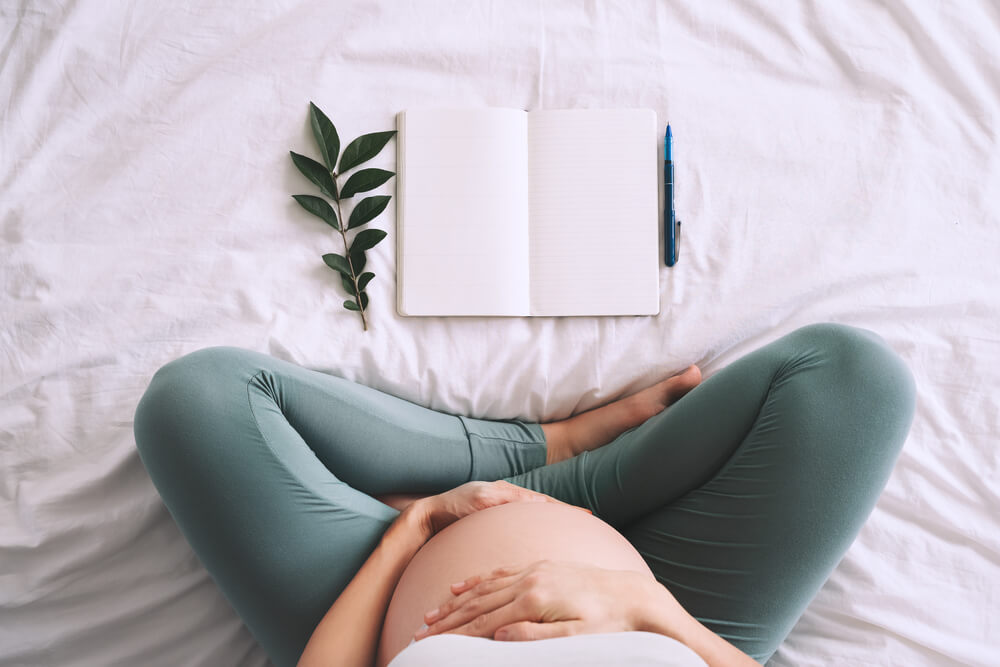Disclaimer: Please note that this blog is for educational purposes only, it includes general information on health-related topics. Women’s Healthcare of Boca Raton is giving medical advice to Patients Only. Follow this link to request an appointment with Dr. Ellman.
Your water broke but no contractions?
When your water breaks during pregnancy, it means that the amniotic fluid has leaked. This indicates that you’ll start having contractions any time soon, and you’re ready to deliver your baby. But, what if your water broke without contractions? What can you do to help induce labor?
In this article, we’ll explain what is water breaking, how to tell if your water broke, and the steps you can take to help start contractions.
What Is Water Breaking?
You may be wondering, what is water breaking? How do I know if my water broke?
Water breaking during pregnancy occurs when the amniotic sac that surrounds your baby ruptures. It consists of thin, white fluid, which we refer to as ‘amniotic fluid,’ and it protects and supports your baby’s growth during pregnancy. When this happens, many women experience painful cramps, known as contractions, meaning that they might be going into labor soon.
When water breaks, many women feel a sensation of wetness in their vagina or constant leaking of small amounts of watery fluid. Some patients may also experience pain and pressure on their pelvis.
Your doctor may use the term “premature rupture of membranes” or PROM. This happens when you have carried your baby full term, your water breaks, and you are ready to go into labor.
However, some women experience water breaking but don’t have contractions, pain, or discomfort.
If that’s the case, we recommend that you contact your doctor right away, which could increase the risk for preterm labor.

What If Your Water Breaks Too Early?
Preterm PROM is a pregnancy complication that occurs when the amniotic sac ruptures before the 37th week of pregnancy. This can increase the risk for infection and stillbirth
Some factors that can lead to preterm PROM include:
- Being underweight with poor nutrition.
- Smoking during pregnancy.
- Those who have already had a preterm birth.
- Vaginal bleeding during the second and third trimesters.
- Having a short cervical length.
If you’re at least 37 weeks pregnant, your doctor may recommend proceeding toward delivery, depending on your medical history.
However, if you are 24-34 weeks pregnant, your healthcare provider may delay both labor and delivery, until your baby develops. That said, they may recommend:
- Antibiotics to help prevent infections.
- Corticosteroids to help your baby’s lungs mature.
- Magnesium sulfate to protect your baby’s nervous system and reduce the risk for neurological impairment.
Now that we have explained what is water breaking and what happens when the amniotic sac ruptures before the 37th week of pregnancy, we can move on to the next section: How to tell if your water broke.
How to Tell If Your Water Broke
If you’re wondering, how do I know if my water broke? What can I do if my waters broke, but I do not have contractions? Read on.
These are the factors that can help you determine if you are experiencing water breaking:
- Color: If the fluid color is pale and clearer than urine, then it is amniotic fluid. If it has a green or green-yellow color, your baby may have probably had bowel movement, and it is meconium that is causing that color.
- Odor: Amniotic fluid is odorless, but sometimes it may have a slight sweet smell.
- Kegel exercises: You can perform some kegel exercises to determine if you experienced water breaking or if it was urine. If the activities do not stop the leaking, then it’s broken water / amniotic fluid.
You can also put on clean underwear, add a pad or pantyliner, and lie down for a few minutes if you feel a sensation of wetness when you get up or fluid pooling in your vagina, it’s water breaking.
However, if your water breaks, the best thing you can do is to call your healthcare provider or head to your delivery facility right away.
Your doctor may perform a physical exam to check if you’re leaking amniotic fluid. An ultrasound may also be helpful if they want to check your amniotic volume fluid.
Don’t use tampons and avoid having sex if your water broke- the amniotic sac protects your baby in a sterile environment, and helps reduce the risk for infection.
Natural Ways to Induce Labor
Your waters broke but no contractions? Here’s what you can do:
Wait
The first thing you can do when your water breaks is to wait. If you don’t have a fever, foul odor, or discolored fluid, your healthcare professional may recommend that you wait until you feel some contractions.
It’s best to keep in mind to avoid getting into a tub of water or engaging in sexual activity.
Nipple Stimulation
You can stimulate your nipples by using your hands or a breast pump, as this can increase the chances of producing oxytocin which can help start contractions.
If you’re manually stimulating your nipples, focus on one breast at a time and spend about 15 minutes on each one. Don’t just focus on your nipples, but make sure also to stimulate the areola, which is the darker area that surrounds the nipples.
Walking
Walking can increase pressure on your cervix, which may lead to a contraction. This can make it easier for the baby’s head to move out through the birth canal.
According to the American College of Obstetricians and Gynecologists, exercising during pregnancy can also help:
- Relieving stress.
- Easing constipation.
- Decreasing your risk of cesarean delivery.
- Reducing back pain.
We recommend that you keep exercising after your baby is born, as this can reduce the risk of deep vein thrombosis. This can develop a few weeks after you deliver your baby.
Muscle stretching
Muscle stretching can also relief cramps and pelvic pain as it opens up contracted areas to release tension.
Acupuncture and acupressure
Acupuncture is a traditional Chinese medicinal practice where people stick needles into the areas of their body to relieve pain and prevent illnesses.
A 2019 study found that acupuncture can help pregnant women who are over age 40. One patient received acupuncture treatment during the 36th week of pregnancy, and the other women received treatment during week 39. The researchers note that both women proceeded toward delivery and they both had natural vaginal births.
Acupressure is another technique where practitioners use their fingers, palms, or elbows to apply pressure to certain areas of the body. They may use it as an alternative treatment to induce labor naturally without any side-effects.
A 2020 study also notes that self-administered acupressure can alleviate the symptoms of constipation during pregnancy in clinical practice.

Medical Intervention
Your doctor may administer Pitocin to help start contractions. It is the artificial version of oxytocin and is given through an IV. It can help start contractions, and your healthcare provider increases the dose every 10-30 minutes until you achieve the desired contraction. Healthcare professionals administer Pitocin only in a hospital setting, as they can ensure that there is no risk for fetal distress or too strong, or long contractions.
Book An Appointment Today
If your water broke and you don’t have contractions, call your midwife or doctor right away so you can discuss your symptoms and the safest course of action for your pregnancy.
We recommend booking an appointment with your healthcare provider if you are planning to get pregnant or have any health concerns that could affect your pregnancy and baby’s growth.
Call now to schedule a consultation.
Sources
Exercise During Pregnancy. (2019). https://www.acog.org/womens-health/faqs/exercise-during-pregnancy
Handayani, S., et al. (2019). Pre-Labor Acupuncture for Delivery Preparation in Multiparous Women Past Age 40. https://www.ncbi.nlm.nih.gov/pmc/articles/PMC6795272/
Kirca, A. S., et al. (2020). Effects of self-acupressure on pregnancy-related constipation: A single-blind randomized controlled study.https://www.sciencedirect.com/science/article/abs/pii/S1550830720302226

Dr. Ellman is a Board Certified OBGYN who established his medical practice in South Florida over 25 years ago. His office, Women’s Healthcare of Boca Raton, is located in Boca Raton, Florida at West Boca Medical Center. Dr. Ellman attended Albert Einstein College of Medicine of Yeshiva University, where he received his medical degree. He went on to intern at Beth Israel Hospital in Boston- an affiliate of Harvard Medical School- and continued his residency at North Shore University Hospital in Manhasset, New York- an affiliate of Cornell Medical School.
Dr. Ellman has practiced Obstetrics and Gynecology in the Boca Raton area since 1995. In addition to treating patients at West Boca Hospital, Dr. Ellman also treats patients through his own private practice, Women’s Healthcare of Boca Raton, located on the West Boca Medical Campus.

